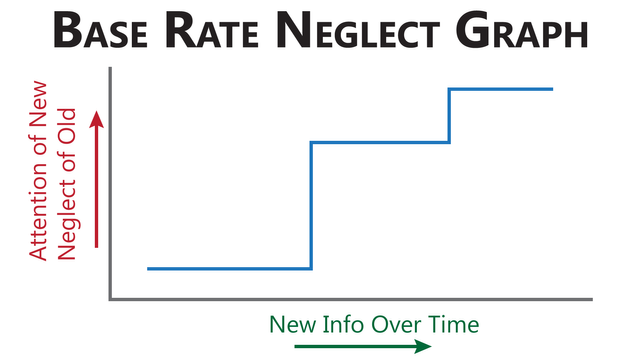
Base rate neglect is the tendency to ignore base general information, in favor of specific (new, novel, attention grabbing) information. The base rate neglect is also known as the base rate fallacy. This bias ties into the previous biases I have covered. Please see the bottom of the post for previous biases.
If something is generally understood, novel new information comes along and sways someone to accept it without integrating it into the previous understanding. The availability heuristic of the new information presented, affects our attentional bias, and we then focus on that new information as an anchoring effect to blind us from paying attention to what we previously knew and understood. The old previous information is boring compared to the new titillating information that grasps our attention.

The better way to deal with new information, is to integrate it into the old information. The previous general conclusion, understanding or model, needs to be updated with the new information. The old should not be neglected, ignored, denied, disregarded, dismissed, etc. We need to appreciate and remember the old information. We have memories of past knowledge. We have to avoid getting sucked in by the wonder, amazement and awe of how novel new information affects us.
This issue is especially evident in probabilistic and statistical decision making. Our ability to intuitively determine probabilities is error-prone. To better understand how probabilities actually function, learning about Bayes' theorem is required. Otherwise, we tend to favor the immediate, anchored, focus of attention on the most available information.
Think of someone investing or playing the stock market. New information impacts us in the moment, and is the most available "in the now". It hits us harder, more vividly. It will affect our current decision making, as it is the most current information. We have fear of missing out on an opportunity that pressures us into focusing on the immediacy of the "new", and that has us also focus on the information in the now more than previous information. Not taking the time to recall previous information, and integrate it in a non-contradictory manner, can and often does result in bad decisions.
The opposite of the base rate neglect, is the conservatism bias. In that case, the base rate is overly weighted, instead of neglected. New information is weighed less and tends to be ignored. That will be covered when I get to the "C" category of biases.
[Sources: 1]
[Image sources: 1]
Previous Cognitive Bias posts:
• Bandwagon Effect - Cognitive Biases (Pt.8)
• Backfire Effect - Cognitive Biases (Pt.7)
• Automation bias - Cognitive Biases (Pt.6)
• Anthropomorphism - Cognitive Biases (Pt.5)
• Availability heuristic - Cognitive Biases (Pt.4)
• Attentional Bias - Cognitive Biases (Pt.3)
• Anchoring or Focusing Effect - Cognitive Biases (Pt.2)
• Ambiguity Effect - Cognitive Biases (Pt.1)
Bias Category: Decision-making, belief, and behavioral biases
Do you want to learn more? ---> Wikipedia list of cognitive biases
Thank you for reading! I appreciate the knowledge reaching more people. Take care. Peace.
If you appreciate and value the content, please consider:
Upvoting  , Sharing
, Sharing  and Reblogging
and Reblogging  below.
below.
 me for more great content to come!
me for more great content to come!
Author: Kris Nelson / @krnel
Contact: [email protected]
Date: 2016-10-20, 10:25am EST

Is that based on our definition conversation yesterday?
Downvoting a post can decrease pending rewards and make it less visible. Common reasons:
Submit
No. Biases, fallacies, logic, is part of understanding consciousness and existence. It's knowing ourselves, so that we can better, more effectively, accurately know how to think, and know how to learn. Failure to understand these things result sin a misunderstanding of reality.
I'm just going through all of the cognitive biases and explaining them for people to learn more. This is #9... hehe.
The conversation yesterday can tie into anything and everything. Definitions are central and foundational to any communication. This post is not about definitions though, as you can see ;)
Downvoting a post can decrease pending rewards and make it less visible. Common reasons:
Submit
Right. I didn't mean to come off petty yesterday, it's just that mughat always turns every discussion into a philosophical one about his own definitions of words. I may have just been frustrated.
Downvoting a post can decrease pending rewards and make it less visible. Common reasons:
Submit
Great info again @krnel, the more we understand ourselves, the more we understand.
Downvoting a post can decrease pending rewards and make it less visible. Common reasons:
Submit
Thanks, true that!
Downvoting a post can decrease pending rewards and make it less visible. Common reasons:
Submit
excellent post @krnel very good job, excellent view congratulations
Downvoting a post can decrease pending rewards and make it less visible. Common reasons:
Submit